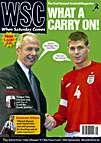 As Raymond Domenech steps up from the Under-21s, some believe the national team just don't pay enough to lure the country's top coaches, writes Ben Lyttleton
As Raymond Domenech steps up from the Under-21s, some believe the national team just don't pay enough to lure the country's top coaches, writes Ben Lyttleton
In a rare moment of candour, France’s football federation president Claude Simonet recently admitted that, in an ideal world, Arsène Wenger would have replaced Jacques Santini as France’s national coach. “He would be the perfect choice but he is light years away from the job,” Simonet said. “There’s no way we could get him, not only because of his club but also because of his salary.” Santini was paid a basic annual salary of £300,000 and Raymond Domenech, the new coach who was promoted from his post as Under-21 boss on the sixth anniversary of France winning the 1998 World Cup, will earn the same. “For me it’s not a question of money,” said Domenech. “I work for the federation and have done for the past 11 years. They’re just offering me a different post.”
While Domenech’s rivals Laurent Blanc and Jean Tigana were prepared to work for that amount, another candidate, Glenn Hoddle, was not. Despite his agent’s claims to the contrary, Hoddle contacted Simonet after his interview to say that he did not agree with the results-based bonus payment scheme on offer.
During Euro 2004, a newspaper published the international coaches’ list of salaries. At the top was England and Sven-Göran Eriksson, bringing home a reported £4 million a year for successive quarter-final defeats. Nearer the bottom was Czech Republic coach Karel Bruckner, whose salary was £40,000: it takes Eriksson three-and-a-half days to earn Bruckner’s annual wage. France were near the bottom of the list, too: an odd sight for recent world and European champions, and perhaps a reason for successive failures in 2002 (under Roger Lemerre) and 2004. There is certainly no shortage of good French coaches: as well as Tigana, Didier Deschamps led Monaco to the Champions League final while Lyon’s Paul Le Guen won back-to-back titles and reached the Champions League quarter-finals last season. On the international front, Bruno Metsu transformed Senegal’s side while Philippe Troussier did the same for Japan.
No wonder Wenger balked when Hoddle’s name was mentioned: “France produces a sufficient number of excellent technical coaches to be able to pick somebody of quality. It would be awful to recruit a foreigner for the job.” Wenger insisted that France will not be able to tempt the game’s finest minds to the coach’s job as long as the salary remains that low. “The function of the France manager needs to be revalued to be able to convince the best managers to come,” he said. “The federation need to be able to offer remuneration which is worthy of the top coaches at Europe’s top clubs.”
France have some of the world’s best players in their squad, but is their coach equipped to get the best out of them? Simonet did not agree two years ago and only changed his mind this summer when Aimé Jacquet made an impassioned plea on behalf of the Direction Technique Nationale, which oversees France’s coaching infrastructure at every level. “Jacquet’s opinion counts a lot for me and Domenech seems to me to be the right choice,” Simonet said. “He has been in charge of the Under-21s for more than 120 matches so he knows just about all the players.”
Domenech is a keen astrologer and also a part-time actor who has appeared in TV plays. The biggest dilemma before his interview was not how to present his vision for the France team of the future, but whether to wear a Mickey Mouse tie or not. He chose not to. More significantly, France never lifted a major competitive trophy in his 11 years as Under-21 coach.
Domenech has a release clause in his contract if France fail to reach the World Cup semi-finals. In that scenario, don’t expect Wenger to jump into the breach. “These days it’s much more interesting to be in charge of a club than in charge of the national team. Outside of the big tournaments, there’s not much to get excited about. The time when national teams were head and shoulders above everything else has gone.” The difference in salaries between national and club jobs proves that Wenger is spot on – with one exception, of course.
From WSC 211 September 2004. What was happening this month